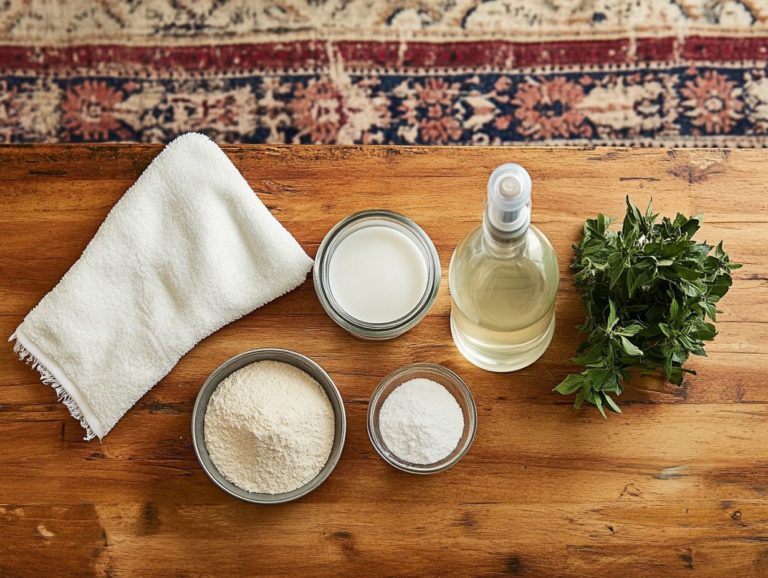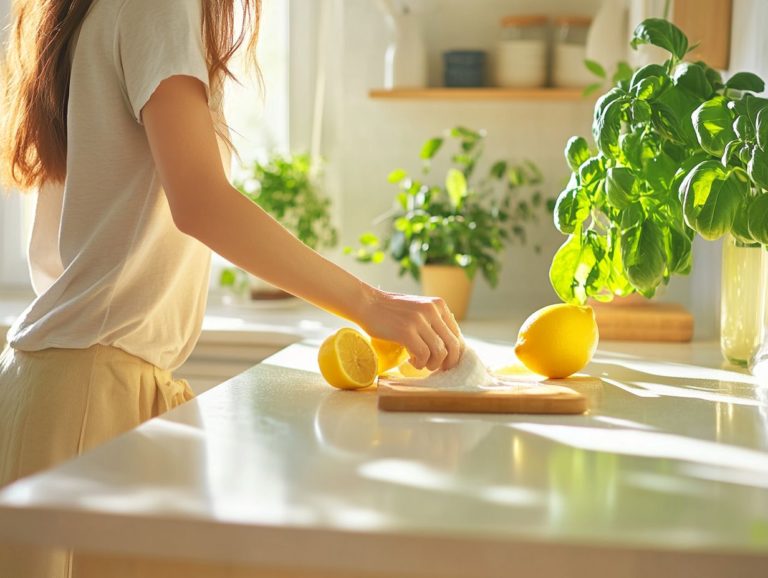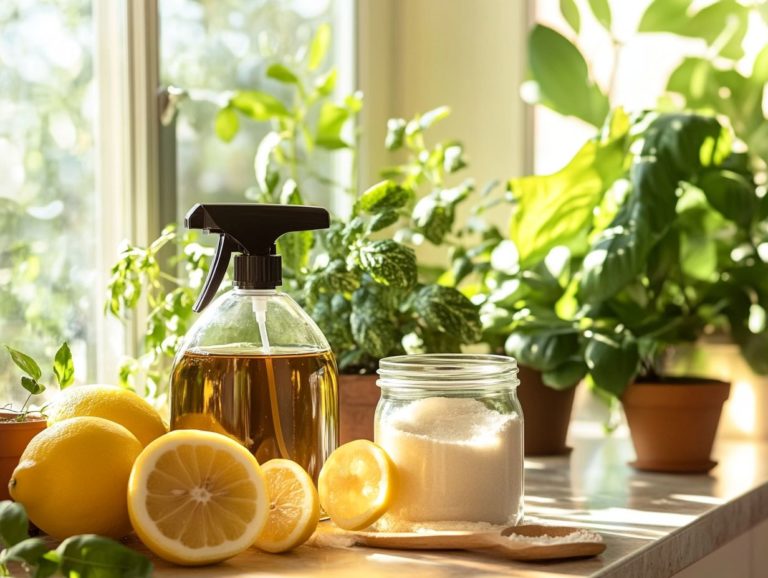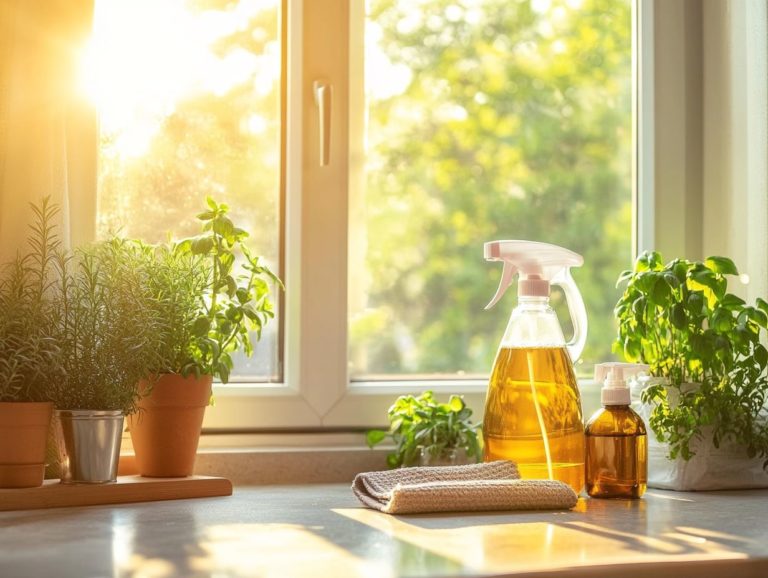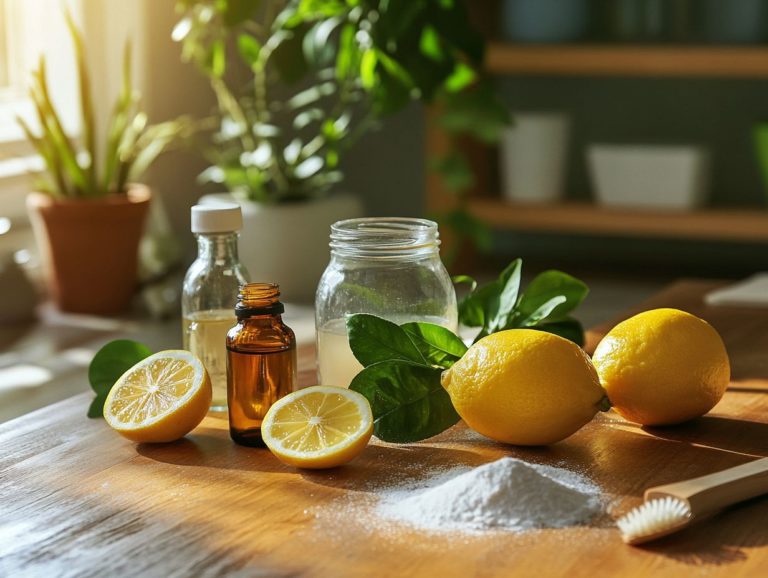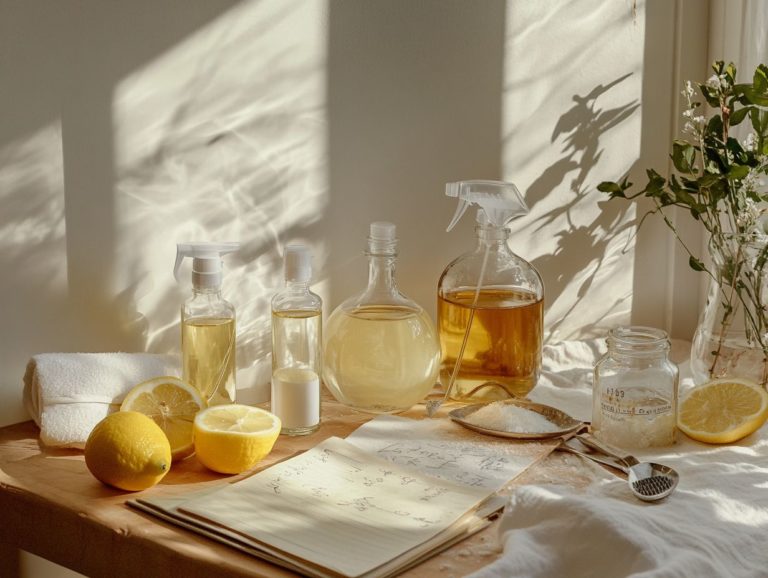Natural Alternatives to Toxic Cleaning Products
In your quest for a clean and safe home, the natural cleaning products you choose can profoundly influence both your health and the environment.
The hidden dangers of toxic cleaning supplies often go unnoticed, lurking behind the enticing promise of gleaming surfaces. Many commercial cleaning products are packed with harmful chemicals that can put your health at risk.
Transitioning to natural cleaning products isn’t merely a trend; it’s an essential step towards a healthier living space and sustainable practices.
Explore the advantages of natural ingredients like baking soda, white vinegar, and lemon juice. Learn the art of crafting your own eco-friendly cleaners and uncover tips for their safe usage.
Embrace a cleaner, greener lifestyle with eco-friendly products today and make a positive impact on both your home and the planet.
Contents
- Key Takeaways:
- Why Switch to Natural Cleaning Products?
- What Are the Dangers of Toxic Cleaning Products?
- What Are Some Natural Cleaning Ingredients?
- How to Make Your Own Natural Cleaning Products
- Excited to find natural cleaning products?
- Tips for Using Natural Cleaning Products Safely
- Frequently Asked Questions
- What are natural alternatives to toxic cleaning products?
- Why should I switch to natural alternatives for cleaning?
- Can natural alternatives clean as effectively as toxic cleaning products?
- What are some common natural ingredients used in natural cleaning products?
- Are natural alternatives to toxic cleaning products safe for all surfaces?
- Are natural alternatives to toxic cleaning products more affordable and sustainable?
Key Takeaways:
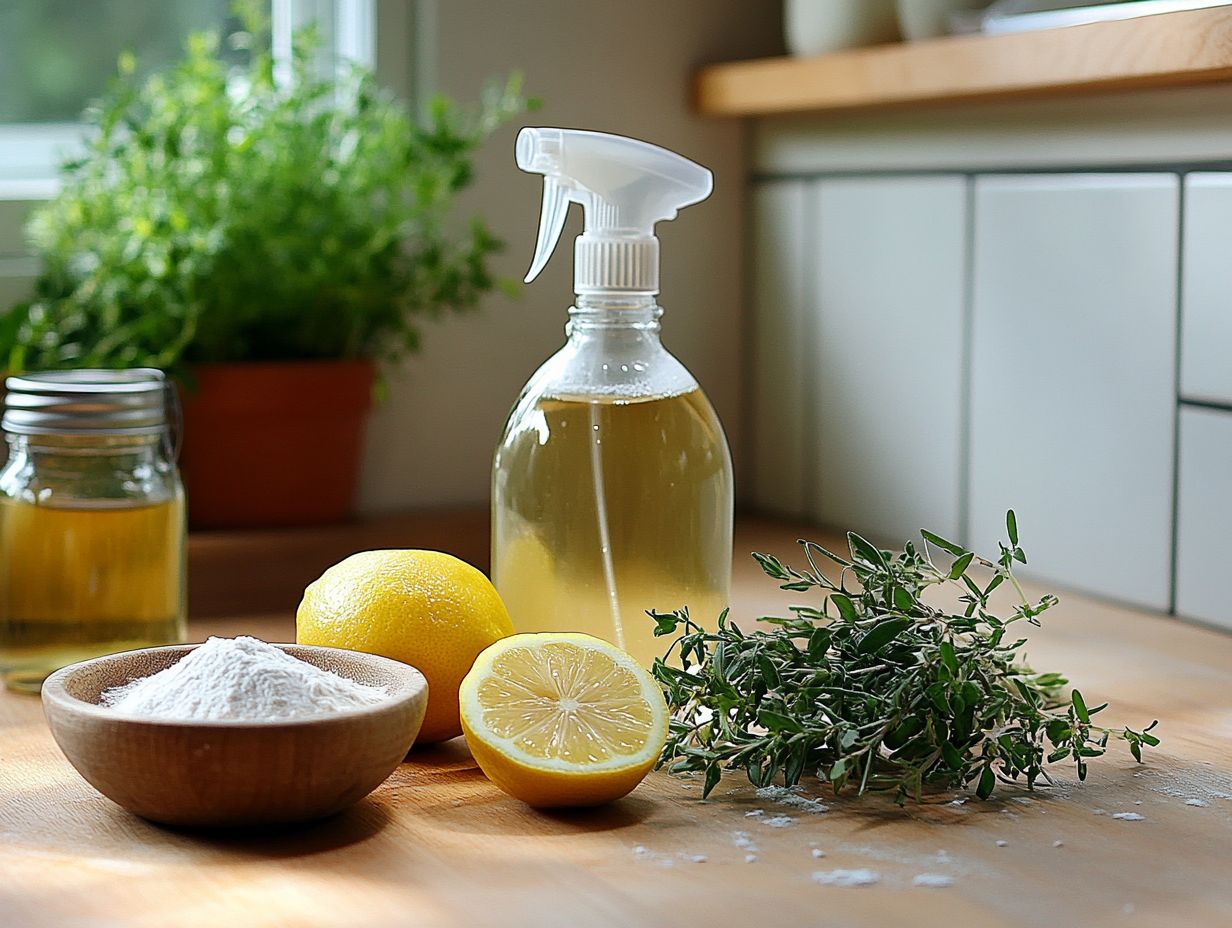
- Natural cleaning products are safer for your health and the environment!
- You can use common household ingredients like baking soda, white vinegar, lemon juice, and essential oils to create effective natural cleaning solutions.
- Find natural cleaning products at health food stores, online retailers like Thrive Market, Grove Collaborative, and Blueland, or make them easily at home. Always read labels, avoid mixing ingredients, and properly dispose of any unused products.
Why Switch to Natural Cleaning Products?
Switching to natural cleaning products is a transformative choice that benefits both the environment and your personal health. With the increasing awareness of harmful chemicals in traditional cleaning supplies, you may be looking for eco-friendly alternatives that keep your home spotless while supporting sustainable practices.
By embracing biodegradable cleaning solutions, you can significantly reduce your ecological footprint while enjoying a living space free from toxic residues, synthetic fragrances, and harmful chemicals. These natural options, often crafted from plant-based ingredients, provide nontoxic solutions that don t compromise on cleaning power, making them the perfect choice for both spring cleaning and your everyday home cleaning routines.
What Are the Dangers of Toxic Cleaning Products?
Toxic cleaning products, often filled with harmful chemicals, pose serious risks to both your health and the environment. Switching to green cleaning alternatives can help reduce these risks.
Many conventional cleaning solutions contain substances linked to respiratory issues, skin irritations, and even long-term health problems like hormonal disruptions and cancer. Prolonged exposure to these toxic compounds can lead to indoor air pollution, jeopardizing the well-being of your household, especially for vulnerable members like children and pets.
Consider this: statistics reveal that over 30% of cleaning products contain chemicals considered hazardous, with notorious culprits like phthalates and VOCs or volatile organic compounds commonly found in household formulations. Using natural cleaning solutions can significantly lower these risks.
Research indicates that regular exposure to these agents can lead to a staggering 20% increase in asthma-related symptoms among children. Poor indoor air quality can lead to more headaches and fatigue, making a compelling case for transitioning to eco-friendly alternatives.
As awareness continues to rise, consumers like you are increasingly demanding safer products. Companies like Common Good, Dropps, and Puracy have stepped up to meet this demand with their eco-friendly offerings. This shift is prompting manufacturers to rethink their formulations to protect families and the environment.
Make the switch to natural cleaning products today and experience the difference! Enjoy a healthier home and contribute to a better planet.
What Are the Benefits of Using Natural Cleaning Products?
Using natural cleaning products offers many benefits beyond just being clean. These eco-friendly solutions, often made from plant-based ingredients, are not only safer for your health but also significantly reduce your environmental footprint. Enjoy cleaner air in your home today, free from the harsh fumes and residues that traditional cleaners leave behind.
Many natural products like baking soda, white vinegar, and lemon juice are surprisingly effective at tackling grime and odors, making them practical choices for your everyday cleaning tasks.
Incorporating essential oils like tea tree and lavender not only adds delightful scents but also introduces antimicrobial properties that help keep your surfaces germ-free. Unlike their chemical-laden counterparts, these natural ingredients won t trigger allergies or respiratory issues, making them ideal for households with children or pets.
Plus, the absence of volatile organic compounds (VOCs), which are chemicals that can pollute the air inside your home, in these products further enhances a healthier indoor environment, reducing irritants that can worsen allergies or asthma.
By embracing natural alternatives, you re not just promoting your own well-being; you re also nurturing a community-oriented commitment to sustainability.
What Are Some Natural Cleaning Ingredients?
Natural cleaning ingredients present a remarkable alternative to commercial cleaning products, delivering effective solutions that are both safe and eco-friendly. Ingredients such as baking soda, white vinegar, and lemon juice are revered for their versatility, effortlessly tackling stains and disinfecting surfaces without harmful chemicals.
Lemon juice, with its natural antibacterial properties, not only infuses a refreshing scent but also enhances the efficacy of your cleaning arsenal. Using other ingredients like unscented soap, rubbing alcohol, and hydrogen peroxide expands your range of effective natural cleaning solutions. Essential oils from plants make your cleaning experience better, offering delightful fragrances while imparting extra antimicrobial benefits.
This makes them ideal for embracing a holistic approach to maintaining your home s cleanliness.
1. Baking Soda
Baking soda stands out as a true powerhouse in the realm of natural cleaning, celebrated for its versatility and remarkable effectiveness in deodorizing and removing stains. This eco-friendly ingredient not only neutralizes odors but also serves as a gentle abrasive, making it perfect for scrubbing surfaces without the risk of scratching.
Whether you’re freshening up carpets or cleaning kitchen counters, baking soda can handle a myriad of tasks, providing a safe alternative to harsh chemicals. It also serves as an excellent component for DIY all-purpose cleaners. Its remarkable ability to trigger a chemical reaction when combined with vinegar amplifies its cleaning prowess, enabling a deeper clean that expertly banishes grime and buildup.
Using baking soda in your fridge can work wonders; simply placing an open box inside absorbs those unwanted odors, restoring freshness. Regarding laundry, it transforms into a powerful stain remover when mixed with water to form a paste, which can be directly applied to affected areas before washing.
For a DIY all-purpose cleaner, combine baking soda, a few drops of dish soap, and water to create a paste that tackles sinks, countertops, and even those stubborn cookware challenges.
While baking soda is generally safe for most surfaces, it’s wise to steer clear of sensitive materials like marble or aluminum, as it could cause damage. Always test an inconspicuous area first before diving into your cleaning tasks.
Start using these natural cleaning methods today for your health and the environment!
2. Vinegar
White vinegar is a highly regarded natural cleaner known for its exceptional ability to cut through grease and disinfect surfaces. Its acidic properties effectively break down mineral deposits, making it an excellent choice for cleaning glass, bathrooms, and kitchens. In addition to its cleaning capabilities, white vinegar serves as a natural deodorizer, leaving behind a fresh scent while eliminating unpleasant odors. As a safe alternative to harsh chemical disinfectants, vinegar can be used in various cleaning solutions, ensuring a spotless environment without the risks associated with toxic substances.
Homeowners often rely on this versatile solution for many cleaning tasks. In the kitchen, mixing vinegar with water creates a powerful solution that effectively removes sticky residues from countertops and stovetops. In bathrooms, a blend of vinegar and baking soda works wonders on stubborn soap scum in tubs and sinks, providing a thorough cleanse.
To maximize its potential, soak a cloth in vinegar and place it on tough stains for a few minutes before wiping. This method not only enhances cleaning effectiveness but also simplifies tackling even the most challenging messes in your home.
3. Lemon Juice
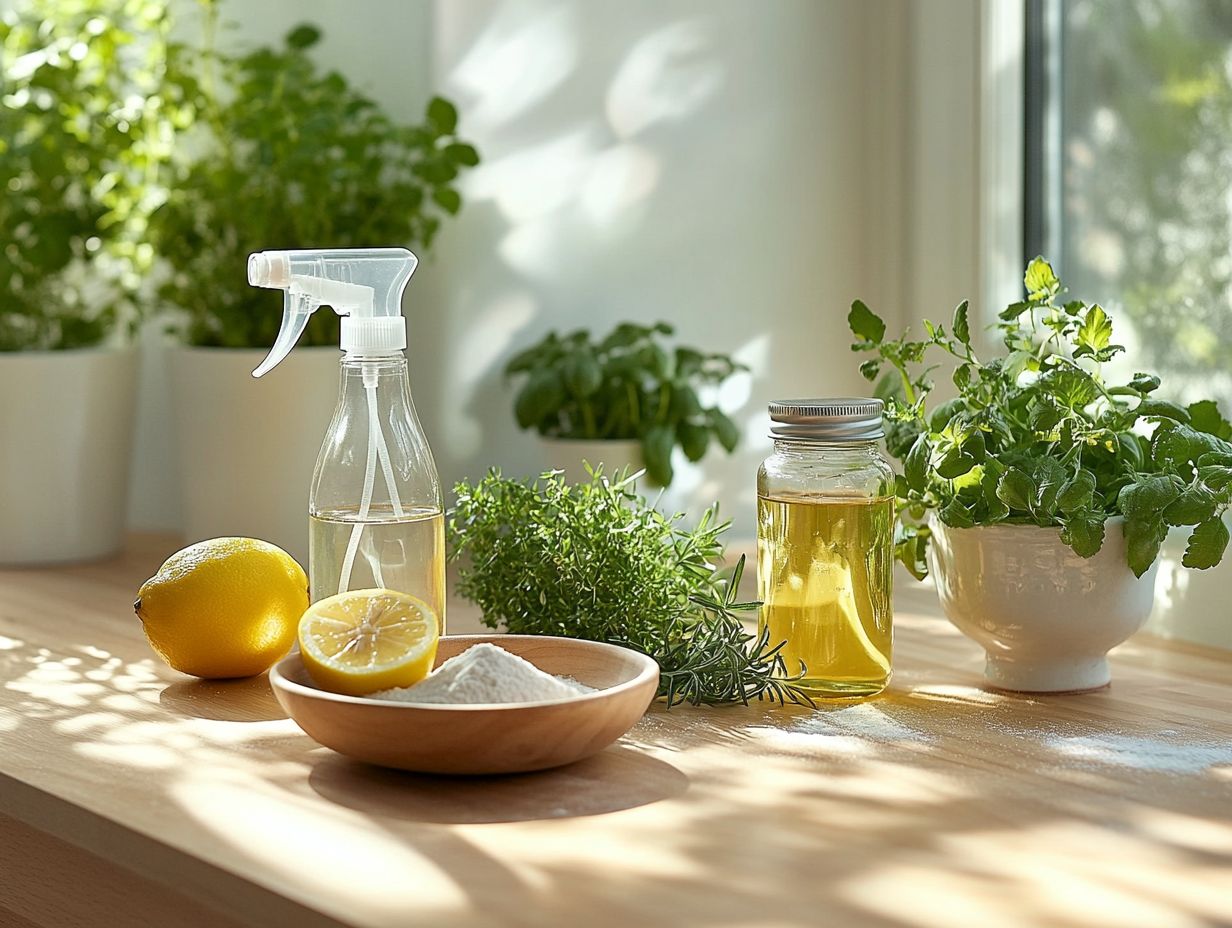
Lemon juice is not only a culinary delight; it also acts as a powerful natural cleaner with impressive germ-killing abilities. When combined with baking soda or white vinegar, it forms a potent cleaning solution for various surfaces.
Its high acidity makes lemon juice highly effective at cutting through grease, removing tough stains, and brightening surfaces, especially in kitchens and bathrooms. The refreshing scent of lemon juice naturally deodorizes spaces, leaving behind a pleasant aroma. By adding lemon juice to your cleaning routine, you can take advantage of its natural cleaning power while avoiding harmful chemicals found in many commercial products.
Lemon juice is ideal for sanitizing cutting boards and kitchen countertops, significantly lowering the risk of foodborne illnesses. For stubborn stains on fabrics, a mixture of lemon juice and baking soda works wonders, effortlessly lifting away discolorations. In the bathroom, a solution of lemon juice mixed with water can be sprayed on surfaces to eliminate soap scum and mildew.
If you want to refresh your living space, consider making a homemade air freshener with lemon juice just mix it with water and a few drops of essential oil. These versatile uses make lemon juice a must-have addition to your eco-friendly cleaning arsenal.
4. Essential Oils
Essential oils are admired for their captivating aromas and impressive antimicrobial benefits that enhance natural cleaning products. Derived from plants, these concentrated extracts improve the effectiveness of your cleaning solutions while adding delightful fragrances to your home.
Oils like tea tree, lavender, and eucalyptus are well-known for their natural disinfectant properties, making them excellent companions for homemade cleaners. By incorporating essential oils into your cleaning routine, you can create a refreshing and clean environment while avoiding synthetic fragrances and harmful chemicals.
Using essential oils in your cleaning tasks not only protects your health but also supports a more sustainable lifestyle. For instance, tea tree oil’s powerful antifungal and antibacterial properties make it perfect for tackling germs in bathrooms and kitchens. Lavender, with its soothing scent, is great for disinfecting surfaces like countertops and doorknobs. Eucalyptus oil, with its invigorating aroma, is ideal for freshening up your laundry and linens.
To create a simple yet effective cleaning solution, mix a cup of water with white vinegar and add 15-20 drops of your favorite essential oil. This blend is versatile enough to clean various surfaces while providing a natural and pleasant fragrance that eliminates germs.
Try incorporating these natural cleaners into your routine for a fresher, safer home!
How to Make Your Own Natural Cleaning Products
Creating your own natural cleaning products is not just an enabling choice; it s a good for the environment decision. You’ll love how easy it is to create safe cleaners for your family!
By harnessing simple ingredients like baking soda, vinegar, and essential oils, you can develop effective cleaners that are safe for your loved ones and kind to the planet.
The art of making DIY cleaning products not only diminishes your dependence on commercial alternatives but also significantly cuts down on packaging waste. This perfectly aligns with sustainable practices.
From all-purpose cleaners to window sprays and air fresheners, the possibilities for crafting homemade cleaners are limitless and deeply satisfying. Try this recipe today!
1. All-Purpose Cleaner
An all-purpose cleaner is an essential tool for maintaining a spotless home. Crafting your own natural version is both simple and effective!
By combining ingredients like white vinegar, baking soda, and water, you create a powerful solution capable of tackling a myriad of surfaces, from countertops to appliances.
This DIY all-purpose cleaner harnesses the grease-cutting power of vinegar and the gentle cleaning action of baking soda. You can enjoy a safe and effective cleaning experience without resorting to toxic chemicals.
To make cleaning a more enjoyable task, enhance the fresh scent with a few drops of essential oils.
With just a handful of household staples, you can whip up a batch that saves you money and minimizes your exposure to harmful chemicals typically found in store-bought cleaners.
Ingredients:
- 1 cup of white vinegar
- 1 cup of water
- 2 tablespoons of baking soda
Instructions:
- In a spray bottle, mix one cup of white vinegar with one cup of water.
- Add two tablespoons of baking soda. Caution: the mixture will fizz initially!
- To add a delightful fragrance, consider incorporating essential oils like lemon or lavender.
- Store your cleaner in a cool, dark place and give it a good shake before each use.
This versatile cleaner shines on kitchen surfaces, bathroom fixtures, glass, and even floors. It s an invaluable companion for a range of cleaning tasks throughout your home!
2. Window Cleaner
Creating your own DIY window cleaner is not only simple but also incredibly satisfying! You ll be left with sparkling, streak-free windows thanks to natural ingredients.
All it takes is a straightforward blend of white vinegar and water to craft an effective solution that effortlessly removes dirt, grime, and fingerprints without the lingering residues of harmful chemicals found in commercial cleaners.
This natural alternative delivers outstanding results and promotes a healthier indoor environment. To elevate the experience, consider adding a few drops of lemon juice or essential oils for an inviting fragrance and enhanced cleaning power.
Ingredients:
- 1 part white vinegar
- 2 parts water
Instructions:
- In a spray bottle, mix one cup of vinegar with two cups of water.
- When it s time to apply your solution, reach for a microfiber cloth or a soft sponge.
- Gently wipe the glass in a circular motion.
- For a flawless, streak-free finish, follow up with a vertical swipe from top to bottom, then a horizontal pass.
This versatile cleaner isn’t just for windows; it works wonders on mirrors and glass tabletops. It s a fantastic multi-purpose solution for your home!
3. Air Freshener
Creating a natural air freshener is an exceptional way to banish odors and freshen up your home with safe ingredients. By combining water with your choice of essential oils think lavender, lemon, or eucalyptus you can craft a delightful and effective homemade air freshener that masks unwanted smells without resorting to synthetic fragrances or harmful chemicals.
This DIY solution is fully customizable to reflect your preferred scents, making any room in your home feel more inviting and pristine. The antibacterial benefits of essential oils elevate your cleaning routine to a whole new level.
The beauty of this homemade concoction lies in its simplicity and versatility. For instance, when you use lavender, you not only gain a soothing aroma but also promote relaxation, making it perfect for bedrooms. Lemon, on the other hand, brings a refreshing, uplifting scent that s just right for kitchens, while eucalyptus invigorates your living areas.
To whip up this air freshener, simply mix one cup of water with 10-15 drops of your chosen essential oil in a spray bottle. You can easily spritz it on linens, drapes, or even in the air around your home, creating a delightful ambiance wherever it s used.
Excited to find natural cleaning products?
Finding natural cleaning products has never been easier; a wealth of options awaits you through various channels, perfectly tailored to your preferences. Health food stores often boast an impressive selection of eco-friendly options, allowing you to discover everything from cleaning agents that break down naturally over time to plant-based solutions made from natural ingredients derived from plants that seamlessly align with your sustainable lifestyle.
If online shopping is more your style, retailers like Thrive Market, Grove Collaborative, and Blueland offer the convenience of browsing for natural cleaning essentials, often with the delightful perk of home delivery.
For those who relish a hands-on approach, crafting your own cleaning products gives you complete control over the ingredients, ensuring they meet your exacting standards.
1. Health Food Stores
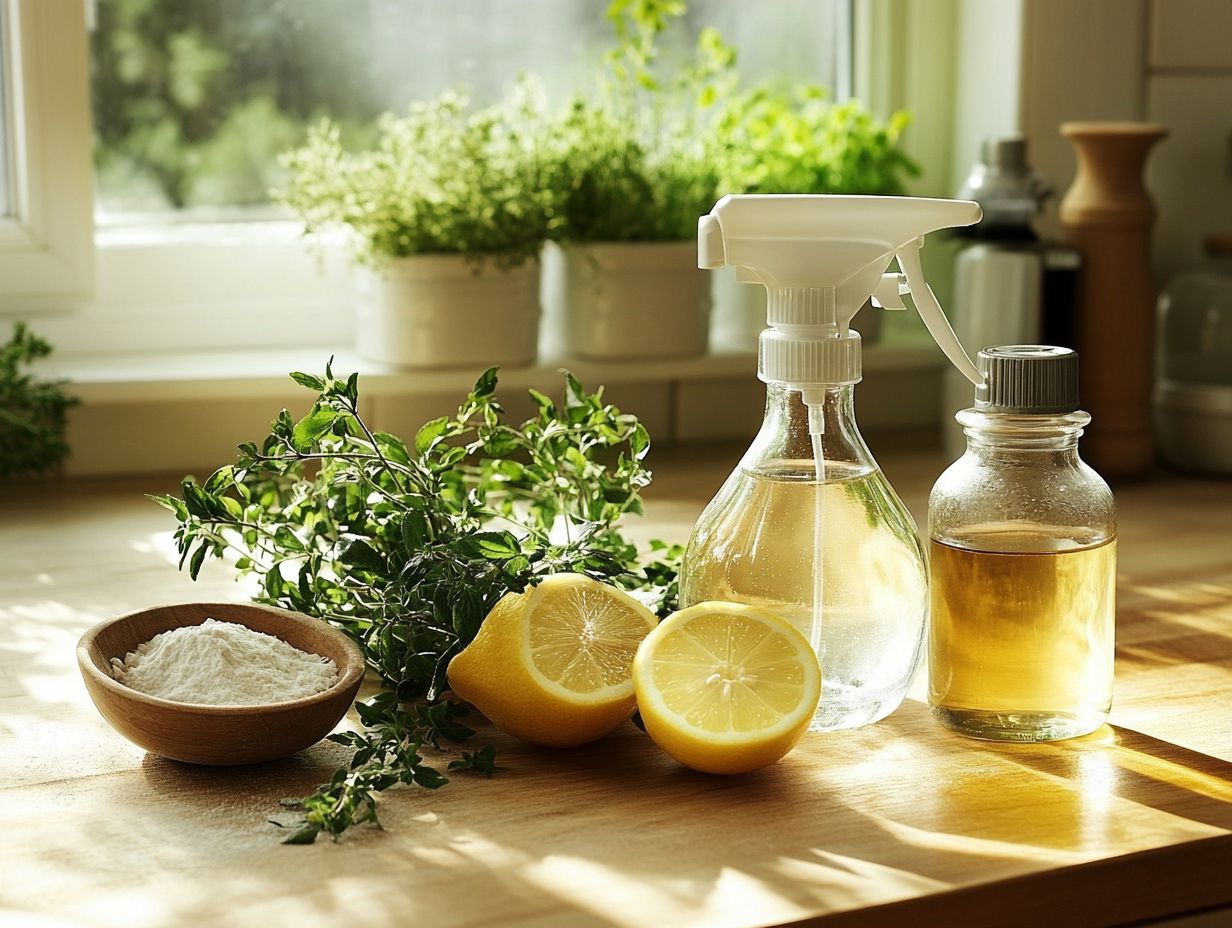
Health food stores are an exceptional resource for you if you’re on the hunt for natural cleaning products, offering an impressive array of eco-friendly options that prioritize both health and sustainability. You’ll often find brands like Attitude, Cleancult, and ECOS on their shelves, all of which emphasize the use of plant-based ingredients and biodegradable materials that are safe for the environment as they decompose.
Beyond just cleaning products, many of these stores provide valuable information about the benefits of natural cleaning, enabling you to make informed choices about your purchases. By shopping locally, you not only support community businesses but also contribute to a more sustainable market for green cleaning solutions.
When you choose to shop at these specialized stores, you can explore products that not only clean effectively but also minimize harmful chemical exposure in your home. Brands like Seventh Generation and Grove Collaborative frequently grace the aisles, showcasing their commitment to environmental stewardship.
Supporting local health food shops fosters a sense of community and connection, as these establishments often prioritize ethical sourcing and organic materials. This commitment resonates with the growing eco-conscious movement, encouraging you to reassess your purchasing habits and opt for eco-friendly products that positively impact both your health and the planet.
2. Online Retailers
Online retailers have redefined your shopping experience for natural cleaning products, offering unparalleled convenience and access to a wide range of eco-friendly options. Websites like Thrive Market and Grove Collaborative specialize in biodegradable cleaning products and sustainable practices.
With just a few clicks, you can browse a wide selection of items that resonate with your values. This ensures that your cleaning routines are effective and considerate of the planet. These platforms typically boast user-friendly interfaces, allowing you to effortlessly filter products by categories such as vegan, cruelty-free, or biodegradable.
Retailers like Amazon and iHerb even provide subscription services, helping you maintain a steady supply of essential items while enjoying the added perk of regular discounts.
Other retailers, such as Blueland and Branch Basics, focus on zero-waste packaging and plant-based ingredients. To truly enhance your online shopping experience, take advantage of seasonal promotions and customer loyalty programs. Don t miss out on these great deals for a cleaner home!
3. Make Your Own
Making your own natural cleaning products is a smart choice that saves you money and grants you complete control over the ingredients you use. By using simple ingredients like baking soda, white vinegar, and essential oils, you can create effective DIY cleaning solutions tailored to your needs.
This method minimizes your reliance on commercial products while significantly reducing waste from packaging and perfectly matches eco-friendly practices. Ingredients like cornstarch, rubbing alcohol, and hydrogen peroxide can also be added.
The satisfaction of creating your own cleaning supplies adds a personal touch to your home cleaning routine. In addition to protecting your health from harmful chemicals, homemade cleaning products can greatly reduce your household expenses.
Basic recipes for all-purpose cleaners or laundry detergents often require just a few pantry staples, providing an affordable alternative to expensive brands. You can easily whip up glass cleaners, kitchen degreasers, and even fabric softeners, ensuring your creations are free from unwanted additives.
Add lemon juice, unscented soap, and borax to increase the effectiveness of your homemade cleaning solutions. Embracing this DIY cleaning movement not only promotes sustainability but also nurtures creativity.
Experimenting with different natural ingredients allows you to customize scents and effectiveness to suit your preferences. With a bit of knowledge and effort, you can transform simple ingredients into powerful tools for a cleaner, safer home, which aligns with green cleaning and sustainable practices.
Tips for Using Natural Cleaning Products Safely
Natural cleaning products tend to be safer than their chemical-laden alternatives, but it’s crucial to use them wisely and effectively. By following a few essential safety tips, you can elevate your cleaning routine while prioritizing the well-being of your family and pets.
Begin by carefully reading the labels to understand the ingredients and correct usage of each product. Avoid mixing different natural cleaning agents, as certain combinations might lead to an unintended chemical reaction or other undesirable reactions.
Finally, be diligent about the disposal of any unused products. Ensure you uphold both safety and environmental responsibility in your home.
1. Read Labels Carefully
Ready to make your cleaning routine safer and more effective? Make sure to choose plant-based ingredients whenever possible for a more eco-friendly cleaning routine!
Reading labels is an essential step when using natural cleaning products. It ensures you know what s in the products you use and how they should be applied. Many products come with misleading claims or lack sufficient information about their components. Therefore, it’s vital to verify that they align with your personal values and health standards.
By understanding the label, you can avoid potential allergens, irritants, or unnecessary additives that could compromise the product’s effectiveness or safety. This practice promotes responsible usage and helps you make informed purchasing decisions while opting for nontoxic solutions.
Being vigilant while inspecting labels can unveil crucial details about a product’s safety and efficacy. Seek brands that clearly list their ingredients. They should be easily recognizable and preferably plant-based. Watch for vague terms like “fragrance” or “surfactants”, as these can mask harmful chemicals. Look for certifications from reputable organizations that endorse environmental and health standards; they provide valuable assurance.
By scrutinizing these aspects, you can make choices that not only clean your spaces effectively but also support a healthier home environment. This enhances both your personal well-being and ecological responsibility.
Key Takeaways:
- Choose plant-based ingredients.
- Verify product claims and ingredient lists.
- Avoid vague terms on labels.
2. Avoid Mixing Ingredients
Avoid mixing different natural cleaning products! This crucial safety measure helps you steer clear of unintended chemical reactions. While many natural ingredients are safe on their own, combining them without proper knowledge can lead to hazards, such as irritants or even toxic fumes. For instance, mixing vinegar with baking soda creates a harmless reaction, but introducing other substances might trigger unwanted effects. Hydrogen peroxide mixed with vinegar can create peracetic acid, a potent irritant.
To keep cleaning safe, use one product at a time and follow specific recipes when crafting your homemade cleaners. Refer to trusted sources for DIY recipes to ensure you are using safe and effective combinations.
Certain combinations, like mixing certain oils with acidic substances, may reduce effectiveness or leave behind unexpected residues. Ammonia found in some natural cleaning products should never be mixed with bleach, as this generates extremely harmful chloramine vapors.
When creating your own cleaning solutions, meticulously follow the instructions in DIY recipes. Remember, “natural” doesn’t always mean “safe” when it comes to mixing.
By focusing on these details, you can maintain a safe environment while still enjoying the benefits of natural cleaning. Always prioritize safety when experimenting with your cleaning solutions. This includes ensuring that your cleaning products are stored safely to prevent accidental ingestion or exposure by children or pets.
Key Takeaways:
- Do not mix different natural cleaning products.
- Follow DIY recipes carefully.
- Store cleaning products safely.
3. Properly Dispose of Unused Products
Devon Holmes, a sustainability advocate, suggests checking local disposal guidelines to ensure you are following the most eco-friendly practices.
Proper disposal of unused natural cleaning products is vital for ensuring your safety and fulfilling your environmental responsibilities. While these products tend to be safer than their chemical counterparts, it s crucial to adhere to disposal guidelines to minimize any potential harm to the environment. Many natural ingredients can be composted or tossed in the trash, but it s wise to check local regulations regarding specific substances. By discarding unused products responsibly, you not only reinforce your commitment to eco-friendly practices but also maintain a clean and safe home. Responsible disposal practices also contribute to a healthier home environment and align with sustainable practices.
Understanding the local waste management guidelines will help you determine the best disposal method. Some municipalities even offer special collection days for hazardous materials, even when they are natural. For example, items that contain essential oils, which can be quite potent in concentrated forms, may require special handling to protect wildlife. Always check if certain natural products might need special disposal to prevent harmful chemicals from contaminating the environment.
Engaging in conversations about sustainability within your community can foster a broader awareness of the importance of environmental stewardship. When you take responsibility for how you manage household products, you are contributing to a larger movement aimed at reducing pollution and preserving natural resources for future generations. This is especially important during spring cleaning, when the propensity to dispose of large amounts of household waste is higher.
Frequently Asked Questions
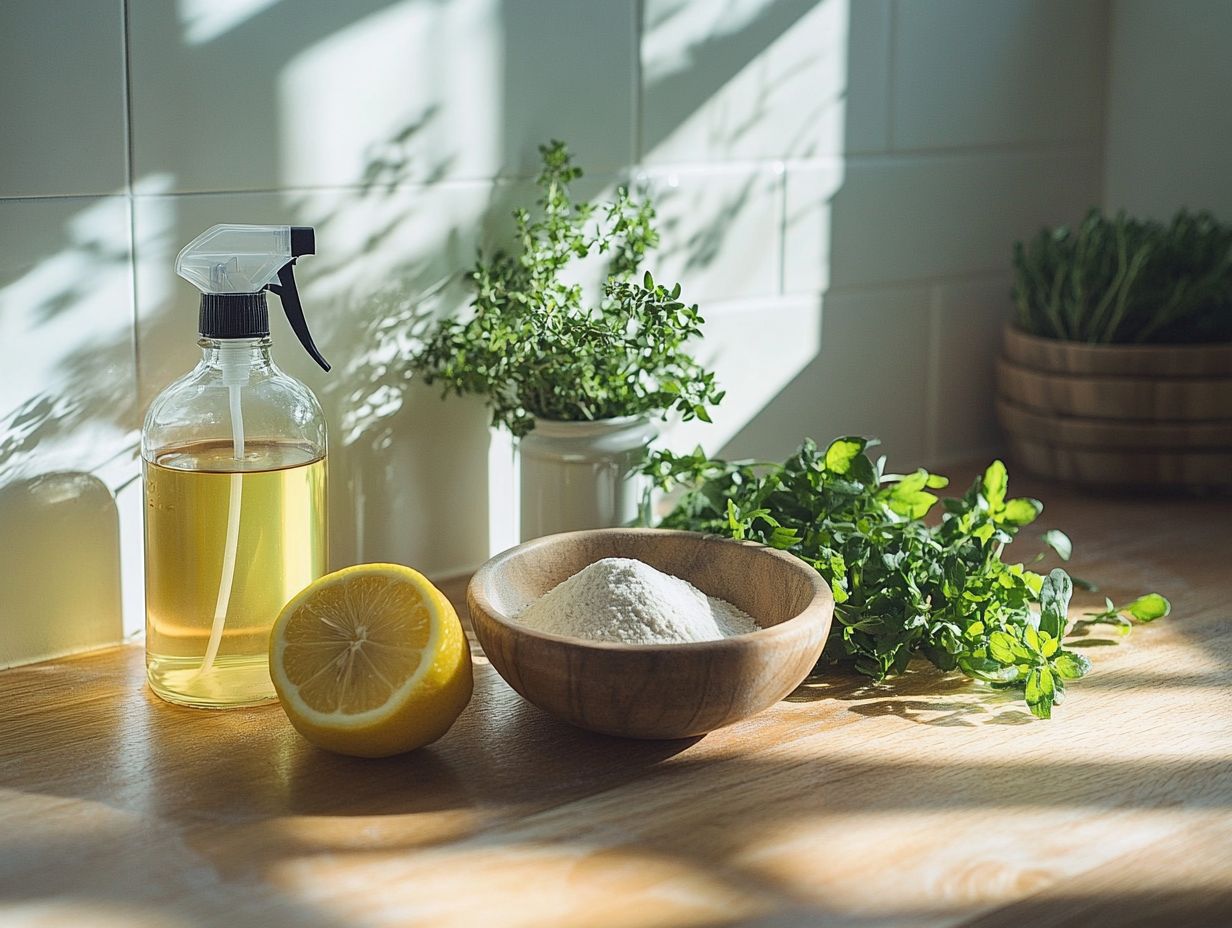
What are natural alternatives to toxic cleaning products?
Natural alternatives to toxic cleaning products are cleaning solutions that are made from natural ingredients, such as vinegar, baking soda, and essential oils. These alternatives are free from harmful chemicals and are much safer for both humans and the environment.
Why should I switch to natural alternatives for cleaning?
Switching to natural alternatives for cleaning is beneficial for your health and the environment. Unlike toxic cleaning products, natural alternatives do not release harmful fumes that can cause respiratory problems or skin irritation. Additionally, they are biodegradable, making them safer for the planet.
Can natural alternatives clean as effectively as toxic cleaning products?
Yes, natural alternatives can clean just as effectively as toxic cleaning products. Ingredients like vinegar and baking soda have powerful cleaning properties that can effectively remove dirt, grime, and stains from cleaning surfaces. They are also versatile and can be used for a variety of cleaning tasks. Additionally, ingredients like hydrogen peroxide and lemon juice serve as excellent disinfectant alternatives.
What are some common natural ingredients used in natural cleaning products?
Some common natural ingredients used in natural cleaning products include vinegar, baking soda, lemon juice, and essential oils like tea tree, lavender, and peppermint. These ingredients have antibacterial, antifungal, and antiviral properties that make them effective for cleaning.
Are natural alternatives to toxic cleaning products safe for all surfaces?
Yes, natural alternatives are safe for most surfaces in your home. However, some surfaces, like marble and granite, can be sensitive to acidic ingredients like vinegar, lemon juice, or white vinegar. It’s always best to do a spot test on a small inconspicuous area before using any natural cleaning solution on a new surface. Consider using eco-friendly products from brands like Grove Collaborative or ECOS for safer options.
Are natural alternatives to toxic cleaning products more affordable and sustainable?
No, natural cleaning products can be cheaper and encourage sustainable practices. Ingredients like vinegar, baking soda, and lemon juice are cost-effective and commonly found in grocery stores.
You can also create your own cleaning solutions with items such as hydrogen peroxide, unscented soap, and rubbing alcohol. This approach can save you even more money.
Biodegradable cleaning products from brands like Blueland, Branch Basics, and Attitude provide non-toxic options. For instance, use baking soda for scrubbing and hydrogen peroxide as a disinfectant to make your spring cleaning both budget-friendly and eco-friendly!

